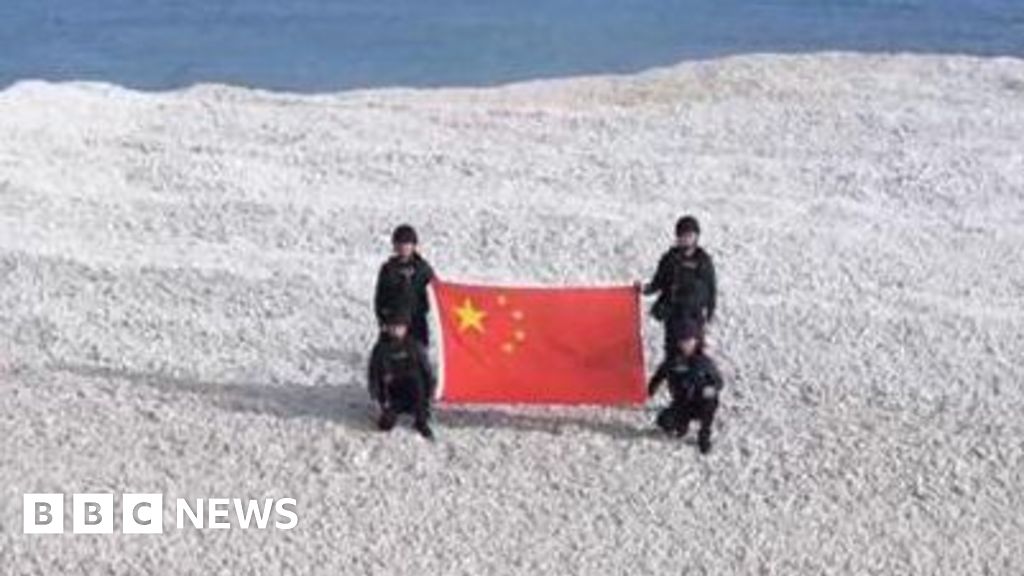Beijing's South China Sea Grab: Control of Tiny Sandbank Sparks Tensions
China's assertive actions in the South China Sea continue to escalate tensions with neighboring countries. The recent focus: a seemingly insignificant sandbank, yet its strategic importance is fueling a diplomatic firestorm. This seemingly minor territorial dispute highlights the larger power struggle unfolding in one of the world's most vital waterways.
The Whitsun Reef Incident: A Spark Ignites a Fire
The recent deployment of hundreds of Chinese fishing vessels near the Whitsun Reef, a submerged sandbar within the Philippines' Exclusive Economic Zone (EEZ), has reignited long-standing territorial disputes in the South China Sea. While China claims the reef falls within its "nine-dash line" – a historical claim encompassing vast swathes of the sea – the Philippines, along with several other nations, vehemently disputes this claim. The sheer number of vessels, ostensibly engaged in "fishing activities," is seen by many as a thinly veiled attempt at asserting control and potentially altering the reef's environmental makeup.
- Environmental Concerns: The massing of fishing vessels raises significant concerns about environmental damage to the fragile coral reef ecosystem. The potential for overfishing and destruction of marine habitats is a major point of contention.
- Military Implications: The Whitsun Reef's strategic location places it close to key shipping lanes and potential military installations. China's increased presence here is perceived as a threat to regional stability and freedom of navigation.
- International Law: The Philippines, supported by several other nations and international organizations, maintains that China's actions violate the United Nations Convention on the Law of the Sea (UNCLOS) and international law.
Beyond Whitsun Reef: A Larger Geopolitical Game
The Whitsun Reef incident is not an isolated event. It's a symptom of a broader strategy by China to assert its dominance in the South China Sea. This includes:
- Island Building: China's extensive island-building activities in the Spratly Islands have significantly altered the region's geography and strategic landscape, creating artificial islands equipped with military installations.
- Maritime Militia: The utilization of its maritime militia, often disguised as civilian fishing vessels, allows China to project power and exert influence without directly involving its military.
- Economic Coercion: China often employs economic leverage against neighboring countries to dissuade them from challenging its claims.
International Response and the Path Forward
The international community has voiced strong concerns over China's actions. The United States, along with several ASEAN nations, have publicly condemned the incursions and called for adherence to international law. However, finding a unified and effective response remains challenging.
- ASEAN's Role: The Association of Southeast Asian Nations (ASEAN) plays a crucial role in mediating the disputes, but its effectiveness is hampered by internal divisions and China's considerable influence.
- Multilateral Diplomacy: Strengthening multilateral cooperation and invoking international mechanisms for dispute resolution are critical for addressing the escalating tensions.
- The Importance of International Law: Upholding UNCLOS and other international laws is essential for maintaining stability and freedom of navigation in the South China Sea.
Conclusion: A Looming Crisis?
The escalating tensions in the South China Sea, ignited by seemingly minor events like the Whitsun Reef incident, represent a significant threat to regional peace and stability. The international community must work together to find a peaceful resolution based on international law, preventing a potential crisis in this vital waterway. The future of this strategically important region hinges on effective diplomacy, unwavering adherence to international norms, and a commitment to peaceful conflict resolution. Failing to act decisively could lead to further escalation and potentially devastating consequences.
Further Reading:
Keywords: South China Sea, Whitsun Reef, China, Philippines, territorial dispute, nine-dash line, UNCLOS, international law, ASEAN, geopolitics, maritime militia, island building, freedom of navigation, regional stability.

